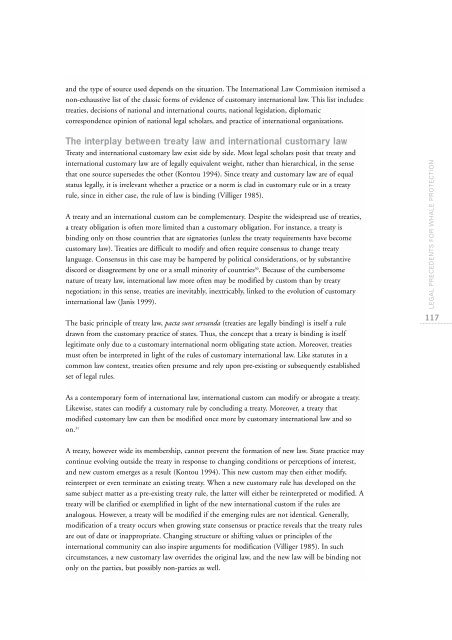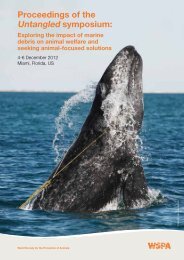<strong>and</strong> the type of source used depends on the situation. The International Law Commission itemised anon-exhaustive list of the classic forms of evidence of customary international law. This list includes:treaties, decisions of national <strong>and</strong> international courts, national legislation, diplomaticcorrespondence opinion of national legal scholars, <strong>and</strong> practice of international organizations.The interplay between treaty law <strong>and</strong> international customary lawTreaty <strong>and</strong> international customary law exist side by side. Most legal scholars posit that treaty <strong>and</strong>international customary law are of legally equivalent weight, rather than hierarchical, in the sensethat one source supersedes the other (Kontou 1994). Since treaty <strong>and</strong> customary law are of equalstatus legally, it is irrelevant whether a practice or a norm is clad in customary rule or in a treatyrule, since in either case, the rule of law is binding (Villiger 1985).A treaty <strong>and</strong> an international custom can be complementary. Despite the widespread use of treaties,a treaty obligation is often more limited than a customary obligation. For instance, a treaty isbinding only on those countries that are signatories (unless the treaty requirements have becomecustomary law). Treaties are difficult to modify <strong>and</strong> often require consensus to change treatylanguage. Consensus in this case may be hampered by political considerations, or by substantivediscord or disagreement by one or a small minority of countries 30 . Because of the cumbersomenature of treaty law, international law more often may be modified by custom than by treatynegotiation; in this sense, treaties are inevitably, inextricably, linked to the evolution of customaryinternational law (Janis 1999).The basic principle of treaty law, pacta sunt serv<strong>and</strong>a (treaties are legally binding) is itself a ruledrawn from the customary practice of states. Thus, the concept that a treaty is binding is itselflegitimate only due to a customary international norm obligating state action. Moreover, treatiesmust often be interpreted in light of the rules of customary international law. Like statutes in acommon law context, treaties often presume <strong>and</strong> rely upon pre-existing or subsequently establishedset of legal rules.LEGAL PRECEDENTS FOR WHALE PROTECTION117As a contemporary form of international law, international custom can modify or abrogate a treaty.Likewise, states can modify a customary rule by concluding a treaty. Moreover, a treaty thatmodified customary law can then be modified once more by customary international law <strong>and</strong> soon. 31A treaty, however wide its membership, cannot prevent the formation of new law. State practice maycontinue evolving outside the treaty in response to changing conditions or perceptions of interest,<strong>and</strong> new custom emerges as a result (Kontou 1994). This new custom may then either modify,reinterpret or even terminate an existing treaty. When a new customary rule has developed on thesame subject matter as a pre-existing treaty rule, the latter will either be reinterpreted or modified. Atreaty will be clarified or exemplified in light of the new international custom if the rules areanalogous. However, a treaty will be modified if the emerging rules are not identical. Generally,modification of a treaty occurs when growing state consensus or practice reveals that the treaty rulesare out of date or inappropriate. Changing structure or shifting values or principles of theinternational community can also inspire arguments for modification (Villiger 1985). In suchcircumstances, a new customary law overrides the original law, <strong>and</strong> the new law will be binding notonly on the parties, but possibly non-parties as well.
The Treaty of the Panama Canal, enacted in 1903, is one such example of customary law modifyingan existing treaty. Panama argued that the treaty was incompatible with new principles of customaryinternational law <strong>and</strong> should be amended. Panama argued:”The 1903 treaty was concluded at a time when colonies <strong>and</strong> the occupation of small countriesby powerful ones was a common practice in the world, that is to say, by a treaty that doesn’tconform to the principles, precepts <strong>and</strong> rules of law, justice <strong>and</strong> international morality which areuniversally accepted today...<strong>and</strong> should therefore be revised.” 32During the UN meetings there was general agreement that the revision of the 1903 Treaty wasnecessary in order to “write off <strong>and</strong> cancel one of those historical mortgages <strong>and</strong> to do so by bringing tobear the entire body of ideas, principles <strong>and</strong> norms that the international community has evolved over thelast decades.” 33118A REVIEW OF THE WELFARE IMPLICATIONS OF MODERN WHALING ACTIVITIESThe implications of customary international law for whalesState practice <strong>and</strong> other soft law 34 has shown that notions of pure conservation without regard forthe welfare of whales <strong>and</strong> other wildlife is becoming outmoded. Thus, the two most recentinternational wildlife agreements focus on protection to the same degree as conservation: The Inter-American Convention For The Protection <strong>and</strong> <strong>Conservation</strong> of Sea Turtles (IAC) <strong>and</strong> Agreement onthe International <strong>Dolphin</strong> <strong>Conservation</strong> Program (AIDCP) both recognise the welfare of the speciesin question: The IAC focuses on the reduction, to the greatest extent practicable, of the incidentalcapture, retention, harm or mortality of sea turtles in the course of fishing activities. Likewise, theAIDCP requires certain protective measures in an effort to keep dolphins from being injured orkilled during tuna fishing operations in the eastern Pacific Ocean.The legal outlook for animal welfare appears to be on increasingly strong ground. Management ofcetacean species has evolved from unrestrained consumption, to regulation for industry’s sake,through an emerging conservation ethic, to the current protection that the great whales enjoy underthe international moratorium on commercial whaling. Commentators argue that the next stage willbe the entitlement of all cetaceans to a basic right to life, which could be realised when themoratorium imposed by the IWC in 1986 becomes permanent 35 , is enforced <strong>and</strong> is extended toinclude small cetaceans.While there is still debate around issues of species rights vs. individual rights <strong>and</strong> also moral vs. legalrights, 36 the energy directed towards the protection of animals in general, <strong>and</strong> cetaceans in particular,over the last 30 years has forced the beginnings of a legislative evolution both nationally, regionally<strong>and</strong> internationally. Far from being radical <strong>and</strong> extremist, this ‘protection’ sentiment is now reflectedin numerous national policies <strong>and</strong> is regularly seen in statements by Parties to internationalmeetings, as well as resolutions adopted by conservation agreements. For example, the IWC hasadopted at least fifteen resolutions whose purpose is to improve the welfare of whales, <strong>and</strong> the mostrecent meeting of the World Parks Congress agreed that marine species require ‘protection’ <strong>and</strong> thattheir habitat needs ‘conservation’ through domestic <strong>and</strong> high seas protected area systems 37 .ConclusionIt is the contention of the authors of this chapter that the emerging international customary law ofanimal protection is well illustrated in the case of cetaceans. Future international agreements directly
- Page 5 and 6:
ForewordWhales are highly evolved a
- Page 7:
1 Executive SummaryThis review exam
- Page 11 and 12:
2 A background to whalingPhilippa B
- Page 13 and 14:
y the weapon’s enormous recoil, w
- Page 15 and 16:
Japan currently whales in the Antar
- Page 17 and 18:
Otto, K. 1997. Animal Pain Behaviou
- Page 19 and 20:
Protecting the welfare of animals i
- Page 21 and 22:
Toothed whales (Odontoceti)Toothed
- Page 23 and 24:
Social behaviourMother-calf pairsOn
- Page 25 and 26:
to store and pass on information to
- Page 27 and 28:
Communication in great whalesThe mo
- Page 29:
Self-awarenessOne of the most compe
- Page 32 and 33:
J.G.M. Thewissen), pp. 158-162. Aca
- Page 34 and 35:
Whitehead, H., Waters, S. and Lyrho
- Page 36 and 37:
humanitarian purposes the time take
- Page 38 and 39:
Welfare and the modern IWCFrom 1980
- Page 40 and 41:
1996 UK proposes guidelines for col
- Page 42 and 43:
Section TwoWhale killing6 Commercia
- Page 44 and 45:
Table 1 Commercial, special permit
- Page 46 and 47:
It can be argued that the figures f
- Page 48 and 49:
Since struck and lost whales can in
- Page 50 and 51:
equipment to Russian subsistence wh
- Page 52 and 53:
This is the time from the throwing
- Page 54 and 55:
Table 3 Aboriginal Subsistence Whal
- Page 56 and 57:
International Aid For Korean Animal
- Page 58 and 59:
29 In Resolution 1999-1, the IWC no
- Page 60 and 61:
For example, Greenland and the Faro
- Page 62 and 63:
the past they made an important con
- Page 64 and 65:
however, has been made on the exten
- Page 66 and 67:
hunt indicate that the whales are s
- Page 68 and 69:
8 Weather, sea condition and shipmo
- Page 70 and 71:
chance of fog decreases from 15 to
- Page 72 and 73: experienced in December, or y could
- Page 74: 9 The potential stress effects ofwh
- Page 77 and 78: Both chase and pursuit cause stress
- Page 79 and 80: and manifest in a series of lethal
- Page 81 and 82: Ridgeway, S. H. (1966). Dall porpoi
- Page 83 and 84: 10 Euthanasia of cetaceansPhilippa
- Page 85 and 86: for the task. The correct target ar
- Page 87 and 88: whales the size of minke whales (Ø
- Page 89 and 90: 11 Review of criteria for determini
- Page 91 and 92: It is apparent from Figure 1, that,
- Page 93 and 94: interpreted criteria, comparisons o
- Page 95 and 96: 90A REVIEW OF THE WELFARE IMPLICATI
- Page 97 and 98: 12 A comparison betweenslaughterhou
- Page 99 and 100: include levels of premature mortali
- Page 101 and 102: the emphasis during some whaling op
- Page 103 and 104: affect an immediate and thereby law
- Page 105 and 106: Table 1 Animal welfare and the Sche
- Page 107 and 108: CIWF Trust, 2002. Farm Assurance Sc
- Page 109 and 110: 13 Ethics and whaling under special
- Page 111 and 112: Table 1. Consideration of the 3Rs i
- Page 113 and 114: skin samples, without the need for
- Page 115 and 116: IWC (2001) Report of the Scientific
- Page 117 and 118: Whales and the lawCetaceans (and wh
- Page 119 and 120: scientific and technical committees
- Page 121: ASCOBANS came into force in 1994. F
- Page 125 and 126: 2 As a result, their need for prote
- Page 127 and 128: law says, but also the extent to wh
- Page 129 and 130: 15 Whaling and welfarePhilippa Brak
- Page 131 and 132: commercial whaling. Times to death
- Page 133 and 134: eath). Using the current criteria t
- Page 135 and 136: possibility of establishing a simil
- Page 137 and 138: international customary law and exi
- Page 139 and 140: 16 Summary of conclusionsModern day
- Page 141 and 142: Glossary136A REVIEW OF THE WELFARE
- Page 143 and 144: 138A REVIEW OF THE WELFARE IMPLICAT
- Page 145 and 146: Appendix IIColour plates©Mark Voti
- Page 147 and 148: 142A REVIEW OF THE WELFARE IMPLICAT
- Page 149 and 150: Figure 13. Processing minke whales
















